#pds and trauma
Text
Steele's Notes on AvPD
AvPD Types
Fearful avoidant – highly dysregulated and explicitly fearful of rejection or criticism. Avoids relationships in order to avoid being hurt. Typically has insight into this conflict.
Dismissive avoidant – Over-regulated. Unaware of need to connect; finds relationships useless or peripheral to work or other activities. View relationships as a “bother.” Has same fear of being abandoned or rejected, but lacks insight and reflection. More challenging to treat.
AvPD Symptoms
Not only avoidant of relationship but of inner experience in general
Strong emotions are highly avoided
May be highly functional / intellectual
May be less functional, unable to work because of avoidance
May have co-occurring shyness / introversion
AvPD Treatment
Therapist should use a collaborative approach, making efforts not to over-activate the client’s attachment system.
Dismissive clients work well when they have specific collaborative goals to work on.
Therapist should not try to get the client to discuss the therapeutic relationship early in treatment. Let the relationship work in more implicit ways (“in the back seat of the car”)
Allow the client to regulate distance and closeness. Therapist should stay steady and not pursue or distance from the client.
Limit session to once a week; keep firm boundaries; don’t encourage dependency or regression
From Kathy Steele’s presentation 'Integrating Personality Disorders in our Work with Complex Trauma and Dissociation' (PDF), 18 August 2021, Delphi Centre.
[Transcribed from a PowerPoint presentation without notes; therefore this post is without context]
94 notes
·
View notes
Text
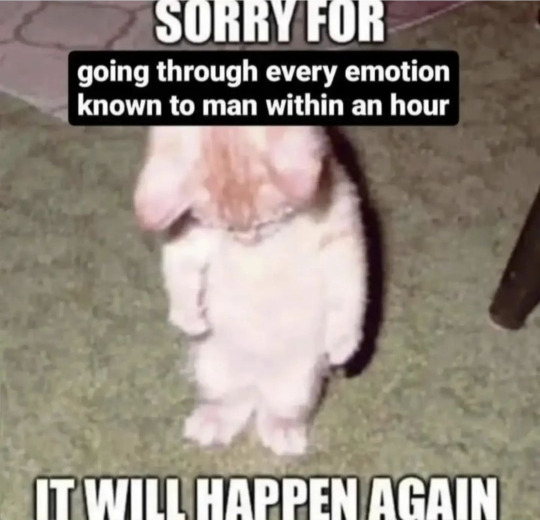
#actually dissociative#did#dissociation#dissociative identity disorder#dissociative system#osdd#did system#traumagenic did#traumagenic osdd#trauma#actually bpd#bpd#bpd thoughts#bpd problems#borderline personality disorder#actually borderline#borderline pd#manic depression#manic depressive#actually mentally ill#mentally fucked#mental illness#mental health
9K notes
·
View notes
Text
a lot of the time, abusers are just regular people. abuse is something we're all capable of - it's a pattern of harmful behavior in which there's power imbalance. we all hold various privileges, connections, and knowledge that can be turned into the power to abuse others. we can all exert our will, thoughts, feelings, etc. onto others in a way that hurts them and takes power away from them.
abusive people have done something horrible and inexcusable, yet they aren't... inherently special. they're people, capable of choosing between right and wrong, capable of change, just as much as others are. i say this in part because i think a lot of people have this lofty idea of abusers that leads them to think they couldn't possibly be a victim of abuse. but abuse can be incredibly mundane - and this also means we all have to watch out for abusive behaviors in ourselves.
abuse isn't just something Obviously Bad People (TM) are capable of... and abuse isn't caused by mental illness, substance use/addiction, gender, etc. etc., even if these things impact what happens. idk. there's no real end point to this post. i just wish people didn't mystify abuse, and realized how (deeply unfortunately) normal and subtle it can be... and often is.
#softspoonie#abuse#abuse survivor#trauma#ableism#sanism#mentally ill#cluster b#cluster b pd#cluster b personality disorder#personality disorders#mental illness#substance use#substance abuse#substance misuse#addiction
4K notes
·
View notes
Text
Here is my controversial mental health take of the day: your negative emotions are not the problem, its the way you handle them that becomes the problem. You being jealous that your friend hung out with someone else and didn't tell you, is actually not the problem. It's when you choose to get angry with them, yell & lash out, or passive aggressively do something they hate to get revenge, or when you ignore them and isolate and self harm, those are all harmful ways to cope with your feelings. Rather than react, take the time to validate yourself, because it's normal to feel jealous or left out and chances are that there are deeper abandonment wounds that are triggered here, probably from your childhood. Take a moment to pause before you react. Then try a direct and open communication to your friend instead. Because I guarantee you they'll respond so much better to you opening up a conversation with, "hey, I felt left out when you hung out with so-and-so without me, can we talk about that? And maybe hang out soon?" Rather than the now laborious and torturous emotional work of having to feel guilty for your rage when you lash out or get revenge. Splitting is normal, because who doesn't get pissed off at someone you're close with? Your switching emotions from highly affectionate to devaluation are not the problem. Everyone gets disgusted & hurt by someone they love at some point in our lives, especially small offenses, I guarantee you chances are that person isn't doing it on purpose and would gladly like to know how you feel, these emotions and conversations are normal and necessary for humans to have. But the inability to clearly and directly communicate your feelings and needs to that person when you are hurt is what makes it toxic. You can absolutely learn how to handle your reactions in a safer manner, how to identify when you're feeling hurt, and how to communicate and ask for clarity and resolution rather than react and escalate. Communication is the backbone of every relationship you will ever have. This is what the emotional work of most personality disorders looks like.
#recovery#trauma#boundaries#mental health#bpd#healing#borderline personality disorder#splitting#emotions#emotional work#shadow work#cluster b#cluster b pds#npd#toxic traits#toxicity#communication#relationships
2K notes
·
View notes
Text
Welcome to my Ted Talk about AsPD, or Antisocial Personality Disorder, which the internet likes to coin as sociopath 👌🏻 if you don’t like long infodumps about stigmatized mental disorders from someone who is diagnosed, move on.
Quick toxic rundown: People with AsPD are generally characterized as emotionless, violent, manipulative abusers who kill animals and like to make other people their bitches. The biggest pet peeve we have is the emotionless, sadistic and abusive generalization.
Personally, we are highly neurotic, with highs and lows of: depression, frantic drive, self abuse tactics, chronic fear, lapses of rejection, overwhelming over-analyzation, grey area thinking, false goods and false bads, ultimatums, obsessive compulsive behavior, harsh self demands, and irritability.
AsPD is a disorder that is caused primarily (according to current research) by trauma and abuse in childhood; most notably being emotional neglect and absent caregivers that cause a child to have emotional shutdowns and repression episodes in an attempt to self soothe. Primary caregivers who do not bond with their children are also a factor. Children learn how to behave from those around them. If a primary caregiver is emotionally distant and unavailable, children will learn that is normal behavior and that’s how people are. If a primary caregiver does not provide empathy and sympathy during moments of distress and fear, children will learn that aloofness and disregard of others feelings is normal behavior. If a primary caregiver does not keep a child safe, children will learn that they should not prioritize their own safety or the safety of others. You can find my follow up post regarding this here.
Neglected and abused children often act out trying to get attention and help, often acting out in bad ways because they lack the ability to articulate what they’re feeling and what is happening to them. The pipeline for AsPD typically is: Oppositional Defiance Disorder as a child, Conduct Disorder as a teen, AsPD as an adult. There are a lot of warning signs cueing that AsPD is becoming a risk for development, but often kids do not have a support system to help negate it as it’s their support system that is usually a factor in its creation.
Being AsPD is like being an emotional La Croix 70% of the time. If you’re depressed, then it’s like someone in the other room has depression and is telling you about it. The other 30% of the time, if you’re depressed, your brain doesn’t understand how to handle it so it’s an ultimatum between doing something drastic to remove the Trigger or ignoring and dissociating for days on end.
People with AsPD are very good at ignoring things. Honestly it’s problematic as fuck but it’s not hard to ignore major issues when you just, don’t care. It’s not in the terms of being cruel or making ourselves not care, but the fact that finding the emotional willpower is so far out of our feasible reach we don’t do it. This causes us to piss people off because we don’t have the capacity to care as much as they want us to, even if we can and do to an extent.
Think of it this way: empathy/sympathy is a deep tub of water that everyone has. They can easily fill their measuring cup for the needed amount of empathy without any issues and it’s easy for them. People with AsPD don’t have a tub of water. We have shallow skillet. When we try to dip our cup to fill it, we can’t, it always comes up short and it is difficult to get any water in it as there is no room for the cup to dive. Our ability to care is limited because we do not have the same emotional resources everyone else does.
❌ False Positives & False Negatives ❌
I operate on what I’ve learned are called false positives and false negatives. These are things that are trained into the brain from an early age based off of childhood trauma and other factors. False positives are a distorted version of why we do something to help ourself and for our own good, meanwhile a false negative is something we do because it’s a threat, or based out of fear.
❌ Some of my false positives:
- It is good to be afraid of nothing
- It is good to adapt to someone’s personality if they are stronger than you
- It is good to isolate yourself
- It is good to be a silver tongue because you can get into any place you want
- It is good to become a social chameleon and shape yourself to whatever those around you need/want most, because then you have no chance of being abandoned
❌ Some of my false negatives, which can explain the false positives as well as core beliefs:
- it is bad to be afraid, if I am afraid then I am vulnerable and it can be used against me
- It is bad to be emotional or show concern for others emotions because they do not care for mine
- It is bad to be able to be exploited, because I believe it is everywhere
- It is bad to allow myself to be bored, because boredom begets bad thoughts and no one can or wants to help me when I spiral
- It is bad to not shape yourself to the social circle, because people quickly grow tired of those who do not match them perfectly and being discarded means I failed
My core beliefs can be viewed as the root for the false positives and negatives, because they are based on the core of trauma, abuse and neglect. They come from patterns and instances that make someone with AsPD become the opposite of what they experienced:
- eat or be eaten
- If I don’t show that my bite is worse than my bark, I will be taken advantage of and I must remain on top because the ones on top are safe
- I must look out for myself because nobody will do it for me
- It doesn’t matter what happens to me, therefore it doesn’t matter what people think of me
- If I cannot do something well, then I should not do it at all
- If you are dependent on others for emotional and mental well being, you are weak, therefore I must isolate myself to avoid becoming codependent and a burden and useless
- If I can handle the stress of a situation better than everyone else, therefore I will keep the problem (financial, emotional, mental, etc) to myself to reduce chances of being abandoned due to failure of perfection
People with AsPD are hard to get along with. We often:
- are always anticipating a fight
- lack respect for authority
- ignore social structures to an extent
- tendency to lie if it’ll lessen punishment or if we feel the lie is more acceptable than our actions
- limit social support because it’s wrong to be dependent on others
- have an inflated view of our own importance — which turns into a self ridicule for believing someome like me could be found important to others —
- can be rude and inconsiderate of others feelings somewhat unintentionally
- are unable to read the correct social cues in relation to empathy towards people and animals
- am constantly confused by others dependence upon empathy and inability to make desicions from logic based standpoints
We can’t speak for everyone who has AsPD, nor are we saying that no one with AsPD is capable of being a murderer/abuser etc. but we are saying that y’all need to stop automatically classifying someone as a certain “type” as soon as you know about their disorder.
One last thing I do want to point out is that it is not uncommon for people with AsPD to derive some sort of enjoyment in causing harm, doing something illegal, hurting someone or animals, etc. This entirely stems from lack of environmental control as a child. Being able to control what happens to others or being able to control the things you say or do that hurts someone else is a hefty high to get addicted to; it soothes the underlying itch of not being able to control your own trauma and abuse, so in turn you push these behaviors onto others and enjoy it because it gives you a sense of power and control. Some people with AsPD do genuinely love hurting others, and some enjoy hurting others when they believe it’s deserved or their ire has been stoked. Some enjoy causing pain to those they think deserve it, and others don’t care who they hurt as long as they feel like they’re in control of the situation.
Hope this have some insight into AsPD 🤙🏻 if y’all have any questions, shoot.
#antisocial personality disorder#aspd traits#aspd#aspd awareness#aspd thoughts#aspd things#actually aspd#antisocial pd#personality disorder#cluster b#glitcher system#did#actually did#did stuff#did system#trauma#childhood neglect#mentalheathawareness#mental illness#destigmatization#sociopath
2K notes
·
View notes
Text
DAKOTA COLE!!
alt title:
SCARS THAT DON'T HEAL
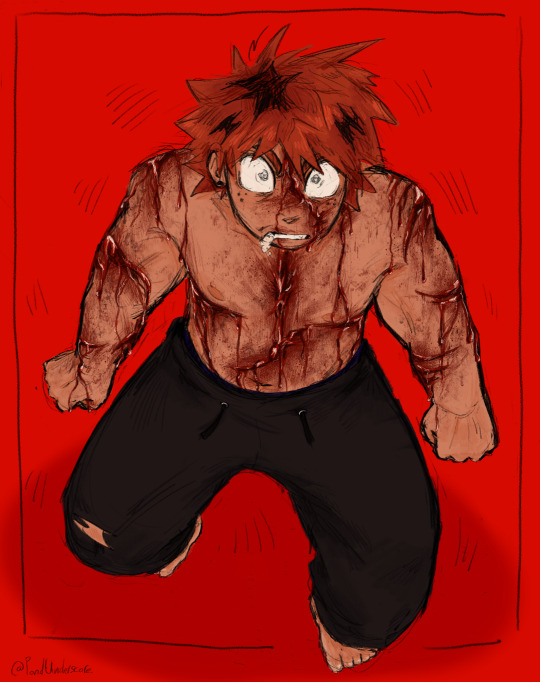
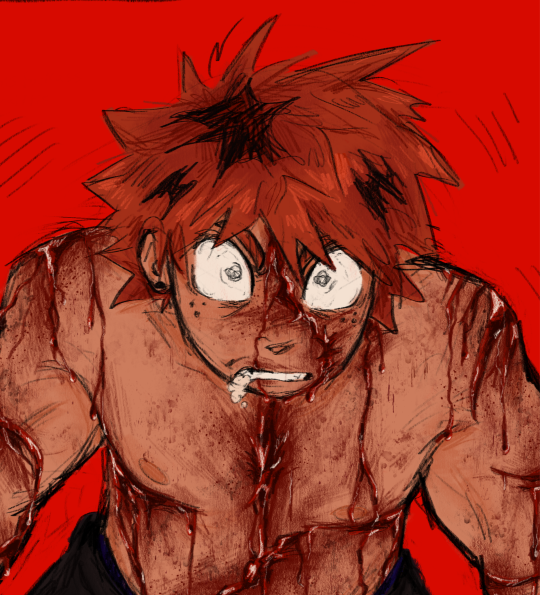
#jrwi fanart#jrwi#jrwi show#jrwi podcast#jrwiblr#just roll with it#just roll with it fanart#jrwi pd#jrwi art#jrwi dakota#dakota cole#dakota jrwi#just roll with it prime defenders#jrwi prime defenders#prime defenders#prime defenders fanart#just roll with it pd#just roll with it podcast#jrwi dakota cole#mfw dakota goes feral#the wounds... they never close... he finds it hard to process emotions and feelings... so the wounds keep seeping... he's always on guard...#dakota's been hurt so much...#every scar was an experience.. every scar is connected to trauma in some way#they never stop bleeding because dakota feels like he never stops fighting#it never stops hurting for dakota#it never stops hurting for dakota.. so the most he can do is ignore or try to overcome the pain and the bleeding and be ready
148 notes
·
View notes
Text
I don’t have ASPD in the “crazy obsessive killer, looking to hurt everyone and anyone around him, abusive horrible person who should be in prison” way I actually have it in the “I will never been able to properly love anyone & it destroys me from the inside out, I am broken and undesirable, if anyone gets near me I’ll hurt them before they hurt me” way
#i have aspd but i relate to a lot of the traits of npd#aspd culture is#aspd safe#aspd traits#aspd thoughts#aspd awareness#aspd feels#aspd positivity#actually aspd#aspd#aspd things#cluster b safe#cluster b#antisocial personality disorder#personality disorder#pd#mental health#mental illness#love#relationship trauma#queer relationships#relationships
235 notes
·
View notes
Text
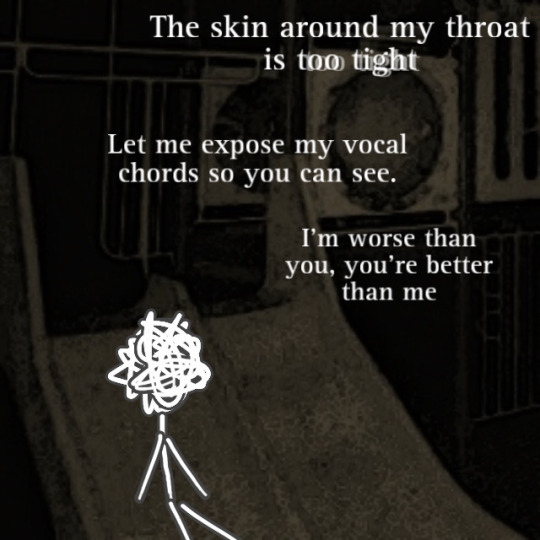
#actually bpd#borderline blog#borderline pd#borderline personality disorder#bpd#bpd safe#bpd thoughts#actually borderline#bpd feels#bpd problems#bpd vent#trauma coping#coping#coping mechanism
139 notes
·
View notes
Text
Steele's Notes on NPD
NPD vs BPD
Generally have less capacity than BPD to mentalize, lack more insight, have more difficulty recalling early abuse/neglect, have less empathy toward others
Severely avoidant of genuine connection;
May need to keep a power differential in the relationship
Don’t respond well to being reassured that they are “human” and “normal,” unlike most borderline clients.
Classic NPD symptoms & behaviours
Arrogant, entitled, critical, controlling, lacks empathy
Inflated “self” is a defense against shame and devalued “self”
Experiences related to devalued self are completely avoided or denied
Generally are unable to acknowledge devalued self
Therapist should not explicitly confront the defense
Acknowledge that it might be lonely and challenging to feel that no one else is good enough
Explore any perceived disadvantages to the defense
Fragile NPD
Alternate between grandiosity and inadequacy
Unhappy, critical of others, anxious, envious, competitive, and have extreme reactions to perceived slights or criticism
Tend to obsessively compare themselves with others
Strong perfectionism
Have narcissistic defenses that work well until they are criticized or rejected
Can access their devalued self: therapist can focus on root causes of devalued self
Reversed NPD
Strong belief and need to be the worst, the sickest, the most traumatized patient
Underlying need to be special, but due to dysfunction, not adequacy
Strong need for validation and compassion
Therapist focuses on emotional validation and less on content of distress
Encourage client to communicate through more positive experiences and affect (compassionately shift focus from negative to positive experiences
Treatment approaches for NPD
Trauma-based in many clients
Certainly affected by quality of early relationships (neglect)
Work with conflicting idealized and devalued selves
Work with inner critic and perfectionism
Mentalization based treatment
Transference based psychotherapy
Dialectical behavior therapy
EMDR and other approaches to resolve early traumatic memories (often not explicitly accessible in the narcissistic patient)
Treatment approaches in Fragile NPD
Identify the conflicting idealized and devalued selves
Help client notice swings between the two
Help client recognize the distortions in both
“I suffer more than anyone; my abuse was the worst; I am completely damaged”
Versus
“I could have been and should be the best”
Help client deal with relentless inner critic
From Kathy Steele’s presentation 'Integrating Personality Disorders in our Work with Complex Trauma and Dissociation' (PDF), 18 August 2021, Delphi Centre.
[Transcribed from a PowerPoint presentation without notes; therefore this post is without context]
#npd#npd info#pd info#kathy steele#trauma and personality disorders#pds and trauma#dogpost#bpd vs npd#npd vs bpd
143 notes
·
View notes
Text
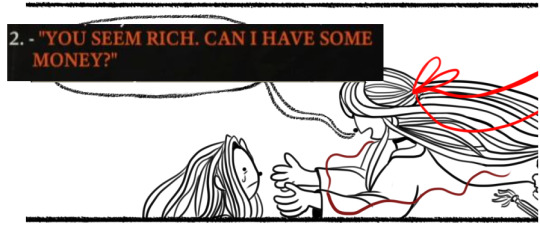
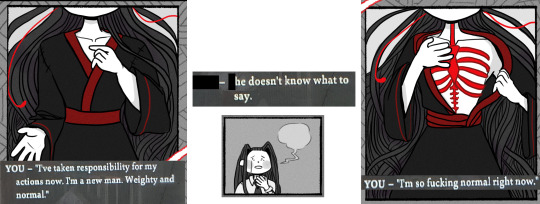
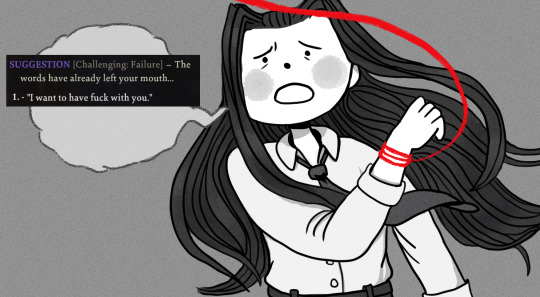
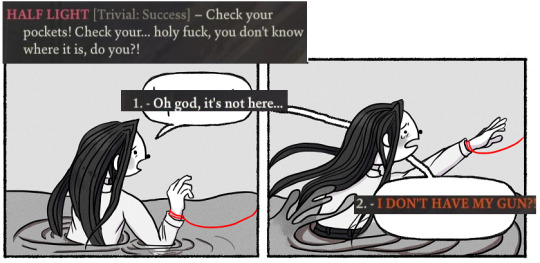
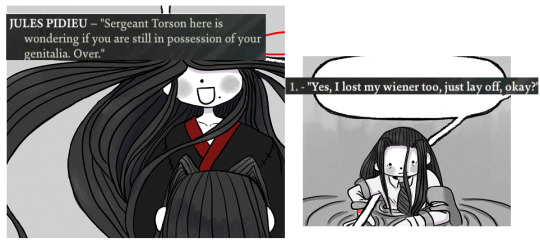
Collection of edits from this comic with Disco Elysium dialogue.
#What do I even tag this#mdzs#mdzs disco elysium au#There are so many line that work very well for them. Alas I was constrained by the panels I had.#So many hbd and kim conversations fit the wangxian dynamic its unreal.#Once again I am politely holding out Disco Elysium as a recommendation: So long as you are aware of it's content and warnings.#It is truly one of the most hopeful games about trauma and despair. It is hilarious in a way that frames the tragedy perfectly.#Be warned that it is a dark and heavy read. But it is truly a life changing experience.#It helped my get out of a bad place in realizing how much I was hurting myself by trying to hold onto the past and regrets.#Go in as blind as you can. If you are ready for it - you will not regret playing this game.#In other news...yeah okay so I meant to spend the rest of my saturday drawing more pd-mdzs#Then I started watching Link Click.... oops where did the time go?#Permit me another day of stalling and I will have comics coming soon. Might sprinkle some LC doodles in the mix too.
264 notes
·
View notes
Text
To preface, I think that Beau and Caleb are fine, and somewhere in Exandria they're being super effective using their respective 10 strength scores to try to smash their restraints into a rock before giving up and trudging off to find a smith shop or an arcane store. HOWEVER.
I am thinking about what a HORRIFIC few moments they just had. Of course they're here chasing Ludinus to this end, because that's what they set out to do, but I don't think there was any imagining in their epilogues to what extent this would go. They signed up for riskier-than-average private investigation work and found a plot to unleash a second Calamity.
And then, when it came down to it, they failed.
They were about as trapped and restrained as they could be, fully at Ludinus's mercy. Behind the charm, did Beau think about how much Yasha was forced to do when her will wasn't her own? Silenced and without magic, did Caleb remember being at the complete mercy of another Cerberus Assembly archmage?
And amidst it all, when was the last time Beau saw Yasha and their kids, whom she's had for no more than five years? When did Caleb last visit Veth or speak to Essek? Does he even know where Essek is right now? Do any of the Nein know specifically where Beau and Caleb are?
They've failed, they're trapped, and they're restrained in ways that explicitly cut off any possible way they might tell their loved ones goodbye, let alone warn them about what they are near certain is about to happen.
And the nature of what looks inevitable in that moment means that even that warning would mean nothing in the end, because while Beau and Caleb are already trapped, there is no escape for anyone in Exandria if Ludinus gets his way.
#anyway I'm not actually angsty about this (see the first paragraph) but I am :3 about the angst of it so I'm inflicting it on all of you#yanno! just for lulz! just for kicks!#empire kids trauma world tour 843 PD#cr spoilers#cr meta#critical role#caleb widogast#beauregard lionett#like man imagine being like 'am I gonna be buried in an unmarked grave'#and then promptly realizing the answer is def yes but mostly cuz no one's going to be alive anymore to find your bodies
641 notes
·
View notes
Text
Really want to iterate and reiterate until it sticks that your problems with communication stem from your parents teaching you that showing emotions and being vulnerable will get you killed.
They told you to stop crying when you were hurt.
They told you to shut up when they hurt you.
They called you stupid when you asked for help.
They dismissed you. They threw you aside. Not just once. Over and over and over until you learned how to stay silent and give them what they wanted.
They put you in constant fight/flight/freeze/fawn because they could not provide you with a safe connection.
And now as an adult we are hard wired to not only expect that as the norm, but go out of our way to reaffirm this hurtful internalization that we are always the problem.
Whereas children with healthier parents take the time to comfort and validate their children's emotions and teach them how to express themselves in a way that makes them feel safe and trusted by the adults around them.
We did not get that.
So this is your PSA to be a little kinder to yourself because you are literally fighting against a world that wouldn't even understand half the shit you've had to go through just to stand where you are today.
This is your PSA to dig a little deeper and pull those hurtful roots of exactly how your parents hurt you as a kid, how they dismissed you, how they taught you how to treat yourself when you are hurt and in need of love and connection with those around you-- and take some of that guilt off your shoulders.
This is your PSA that healthier ways of communication absolutely do exist in this world and you are absolutely worthy and capable of learning how to address the harder topics in a way that makes you feel safe and trusted with not only others around you, but with yourself as well.
And this is your PSA that none of this bullshit is your fault and you can leave that burden behind any time you feel ready to do so.
🌸🌸🌸🌸🌸🌸🌸
#mental health#recovery#trauma#ptsd#boundaries#healing#bpd#relationships#toxic relationships#positive mental health#positive affirmations#attachment theory#communication#cluster b personality disorders#cluster b#pd safe
291 notes
·
View notes
Text
The biggest BPD shock (also ASPD & psychosis) I've experienced was probably when I walked away from a 1,5-year-long friendship in which I constantly had fights, arguments, triggers and splits going off, threats thrown around, and at the time I walked away, I had another friendship formed with a different system. And suddenly, I was barely splitting, like once a month, maybe? When I did, I was met with affection and love, I was way more stable, could communicate better, didn't question every single second whether these people loved me or not, psychosis wasn't going off nearly as much as it used to, and my anger issues seemed to just disappear, leaving me questioning whether I had them in the first place.
And eventually, I found out that people with BPD are a mirror of their loved ones, and was like: "Wait, hold up- I WAS NOT THE PROBLEM THE ENTIRE TIME?!?!?!"
@the-soup-system
-host
#directed at our partner system#bpd#borderline personality disorder#bpd mood#bpd problems#bpd thoughts#borderline pd#bpd blog#borderline blog#borderline thoughts#bpd emotions#borderline problems#healing from abuse#healing from trauma#healing#trauma recovery#abuse recovery#emotional abuse#verbal abuse#gaslighting#bpd recovery#recovery#partner system#healthy relationships
152 notes
·
View notes
Text
"I, Jay Halstead, take you Hailey Upton as my wife."
"I promise to faithfully love you in sickness and in health."
"In sorrow and in joy."
"From this day forward, I choose to join my life with yours."
"From this day forward, I choose to join my life with yours."
❤️
#the episode that meant the most to jesse#events may have given them a nudge#but all their decisions were made out of love#they may have both experienced trauma that influenced their methods#but this was always where they wanted to be#they just never felt deserving of it#which is something completely different#chicago pd#upstead#jay halstead#hailey upton#s9#jesse lee soffer#tracy spiridakos#video#cpdvid
79 notes
·
View notes
Text
I feel like it isn't talked about enough, but AvPD is frequently caused by trauma. It's totally valid if you have AvPD that wasn't caused by trauma, but I want to shoutout:
Folks who have AvPD because of childhood abuse
Folks who have AvPD because of childhood neglect (physical or emotional)
Folks who have AvPD because of overly critical parents
Folks who have AvPD because of parents who were doing their best. And parents that truly loved them (That doesn't change how damaging their actions were)
Folks who have AvPD because they had another form of neurodivergence
Folks who have AvPD because of bullying
Folks who have AvPD because of being LGBTQIANP+
Folks who have AvPD because they’re physically disabled
Folks who have AvPD because they’re mentally disabled
Folks who have AvPD because they’re intellectually disabled
Folks who have AvPD because they’re developmentally disabled
Folks who have AvPD because of domestic violence
Folks who have AvPD because of abusive relationships
Folks who have AvPD because of another PD
Folks who have AvPD because they were undervalued
Folks who have AvPD because they weren’t believed
Folks who have AvPD because they have physical differences
Folks who have AvPD because they’re a racial or cultural minority
Folks who have AvPD because of poverty
Folks who have AvPD because of religious trauma
Folks who have AvPD because of medical trauma
Folks who have AvPD because academic trauma
Folks who have AvPD because they’re alterhuman+
Folks who have AvPD because of sexual trauma
Folks who have AvPD because of manipulation
Folks who have AvPD because of gaslighting
Folks who have AvPD because of reasons I forgot
Folks who have AvPD because of multiple traumas
Folks who have AvPD because reason they’re unsure of
Folks who have AvPD because something other than trauma
Folks who have AvPD
You’re doing a great job
I’m proud of you
You deserve to take up space
You’re perfect as you are
I love you.
#avpd#avpd problems#avoidant personality disorder#cluster c personality disorder#pd#personality disorder#actually avpd#avpd positivity#avpd things#actually avoidant#avoidant pd#apd#trauma#childhood trauma#positivity
325 notes
·
View notes
Text
trauma
TW: childhood trauma
I think my biggest problem with my childhood trauma is just the fact that it was childhood, specifically.
like, how can you look at a kid, a literal child, and hurt them? Like, they’re so innocent and eager to please, they just want to be happy.
kids could will ask questions about anything and everything because the world is so new and exciting to them
kids will cry if someone hurts a bug, because even the smallest creatures are worthy of love to them
kids will want the most scuffed looking stuffed animals or take a rock home as a pet because they see beauty in everything
How can a child be so deserving of the pain when all they have to offer is love??
If you had to go through any of that, I’m so sorry. You didn’t deserve it, you never did
#mental illness#mental health#trauma#anxitey#mental health awareness#mental health positivity#mental heath awareness#positive mental attitude#mental heath support#emotional health#mental wellbeing#childhood trauma#bpd#bpd feels#bpd thoughts#bpd stuff#bpd vent#borderline personality disorder#borderline pd#actually borderline#bpd problems#actually bpd
70 notes
·
View notes